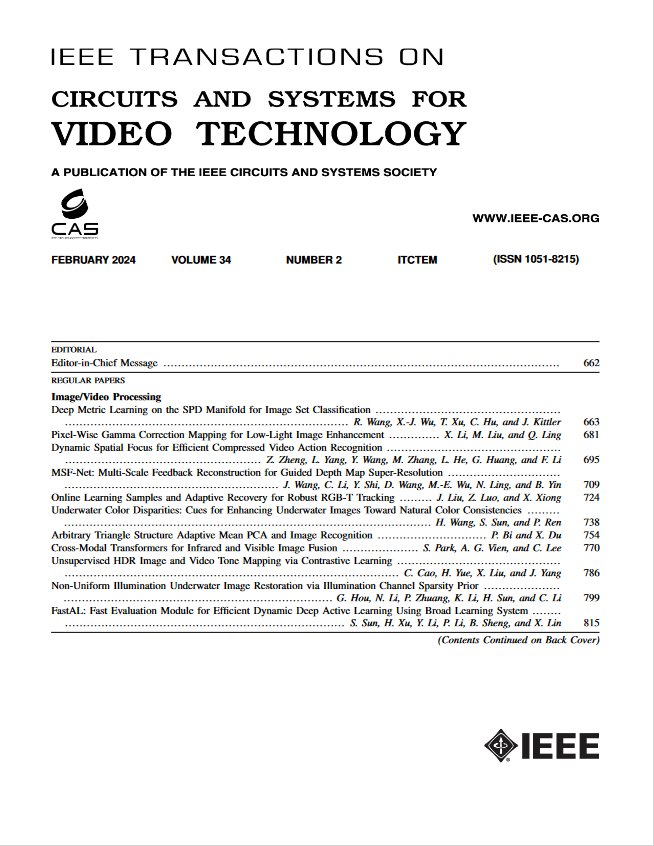Class-Aware Prompting for Federated Few-Shot Class-Incremental Learning
IF 11.1
1区 工程技术
Q1 ENGINEERING, ELECTRICAL & ELECTRONIC
IEEE Transactions on Circuits and Systems for Video Technology
Pub Date : 2025-03-14
DOI:10.1109/TCSVT.2025.3551612
引用次数: 0
Abstract
Few-Shot Class-Incremental Learning (FSCIL) aims to continuously learn new classes from limited samples while preventing catastrophic forgetting. With the increasing distribution of learning data across different clients and privacy concerns, FSCIL faces a more realistic scenario where few learning samples are distributed across different clients, thereby necessitating a Federated Few-Shot Class-Incremental Learning (FedFSCIL) scenario. However, this integration faces challenges from non-IID problem, which affects model generalization and training efficiency. The communication overhead in federated settings also presents a significant challenge. To address these issues, we propose Class-Aware Prompting for Federated Few-Shot Class-Incremental Learning (FedCAP). Our framework leverages pre-trained models enhanced by a class-wise prompt pool, where shared class-wise keys enable clients to utilize global class information during training. This unifies the understanding of base class features across clients and enhances model consistency. We further incorporate a class-level information fusion module to improve class representation and model generalization. Our approach requires very few parameter transmission during model aggregation, ensuring communication efficiency. To our knowledge, this is the first study to explore the scenario of FedFSCIL. Consequently, we designed comprehensive experimental setups and made the code publicly available.联邦少次类增量学习的类感知提示
FSCIL (Few-Shot Class-Incremental Learning)旨在从有限的样本中不断学习新的类,同时防止灾难性遗忘。随着学习数据在不同客户端的分布和隐私问题的增加,FSCIL面临着一个更现实的场景,即很少的学习样本分布在不同的客户端,因此需要联邦少射类增量学习(FedFSCIL)场景。然而,这种集成面临非iid问题的挑战,影响了模型的泛化和训练效率。联邦设置中的通信开销也带来了重大挑战。为了解决这些问题,我们提出了联邦少次类增量学习的类感知提示(FedCAP)。我们的框架利用预先训练的模型,通过类智能提示池进行增强,其中共享的类智能密钥使客户端能够在训练期间利用全局类信息。这统一了跨客户端对基类特性的理解,并增强了模型的一致性。我们进一步集成了类级信息融合模块,以改进类表示和模型泛化。该方法在模型聚合过程中只需要很少的参数传输,保证了通信效率。据我们所知,这是第一个探索FedFSCIL情景的研究。因此,我们设计了全面的实验设置,并使代码公开可用。
本文章由计算机程序翻译,如有差异,请以英文原文为准。
求助全文
约1分钟内获得全文
求助全文
来源期刊
CiteScore
13.80
自引率
27.40%
发文量
660
审稿时长
5 months
期刊介绍:
The IEEE Transactions on Circuits and Systems for Video Technology (TCSVT) is dedicated to covering all aspects of video technologies from a circuits and systems perspective. We encourage submissions of general, theoretical, and application-oriented papers related to image and video acquisition, representation, presentation, and display. Additionally, we welcome contributions in areas such as processing, filtering, and transforms; analysis and synthesis; learning and understanding; compression, transmission, communication, and networking; as well as storage, retrieval, indexing, and search. Furthermore, papers focusing on hardware and software design and implementation are highly valued. Join us in advancing the field of video technology through innovative research and insights.

 求助内容:
求助内容: 应助结果提醒方式:
应助结果提醒方式:


